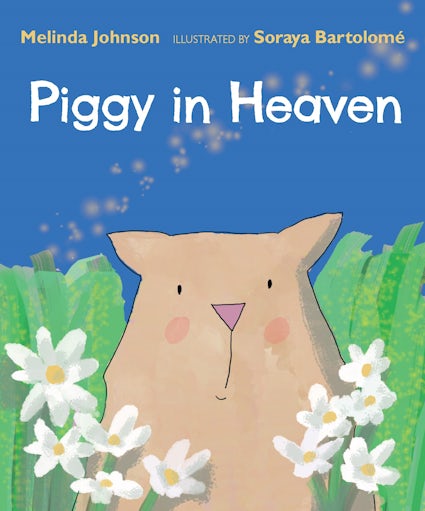My children had the chance to review the newest book from Melinda Johnson, Piggy in Heaven. This is a small little board book filled with bright, colorful images and simple, gentle language that belie its true depth. It is just a little board book but it also a very handy tool designed to help very small people deal with very big losses. This is a book about the death of a beloved pet guinea pig named Piggy, one that the author’s family once owned.
I believe that it is critical to teach children both to love and to grieve. If we are unable to one we will never be able to do the other and there are people, dreams, hopes, and even animals which deserve both. For many children, their formative years will be punctuated by death and learning how to live with it and through it is an important skill because all life is temporary. Nothing lives forever. Like all things that children must learn, grief is a part of the landscape of living.
In the story, Piggy finds perfect natural happiness with health and vigor and grass and daisies and even friends. Piggy is not alone. This is critical. Children see their pets needing themselves as much as they need their pets and the fear that the pet will miss the child can be upsetting. Piggy is happy which is as much as any child can ask.
Last night, I read this book to my children, all of them heaped around on the sofas, the two youngest in my lap. My eight-year-old, Sophia, liked the story so much that she immediately read it again to herself. She told me that she thinks this is an important book because kids will lose their pets at some point. They need to have this book so that they already have it when they lose their pet. She is not wrong.
My youngest, Claudia, is not yet six. For her this book was evocative. It reminded her of her cat’s death two Christmases ago. Sadly, it is pretty much her earliest memory. She struggles occasionally with remembering his death. We have a new young cat but it is not her elderly cat whose only goal in life was to lay close to Claudia and be stroked. I think it is worth mentioning that some children might find this a difficult book to read; not a bad read, just hard. That’s okay. It is important to work through these feelings so that we are prepared to work through even bigger ones down the road. Thinking about this book today, she is glad that she read it and still thinks it is a good book to read but wants other children to know that it is okay if it makes them cry. She is also not wrong. Sometimes kids need an opportunity to cry and if this book helps with that, then it is still helping.
The book is published by Paraclete Press and is available from their website HERE as well as other major retailers. I received a free advance copy of the book with no obligation to review or give a positive review. The thoughts expressed here are my own or those of my two youngest children. I wholeheartedly recommend this book and I am so glad that I had the opportunity to read this with my children.


